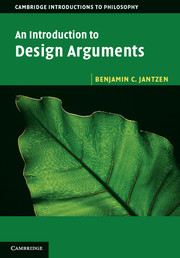Book contents
- Frontmatter
- Dedication
- Contents
- List of figures and tables
- Preface
- 1 Introduction
- 2 Preliminaries
- 3 Arguments from antiquity
- 4 Medieval arguments
- 5 The golden age of natural theology
- 6 Unusual design arguments
- 7 Hume
- 8 Paley
- 9 Darwin
- 10 Loose ends
- 11 The modern likelihood argument
- 12 Intelligent design I: irreducible complexity
- 13 Intelligent design II: specified complexity
- 14 What is complexity?
- 15 Supernatural agents and the role of laws
- 16 A brief survey of physical law
- 17 Fine tuning I: positive arguments
- 18 Fine tuning II: objections
- 19 Conclusion
- Bibliography
- Index
13 - Intelligent design II: specified complexity
Published online by Cambridge University Press: 05 June 2014
- Frontmatter
- Dedication
- Contents
- List of figures and tables
- Preface
- 1 Introduction
- 2 Preliminaries
- 3 Arguments from antiquity
- 4 Medieval arguments
- 5 The golden age of natural theology
- 6 Unusual design arguments
- 7 Hume
- 8 Paley
- 9 Darwin
- 10 Loose ends
- 11 The modern likelihood argument
- 12 Intelligent design I: irreducible complexity
- 13 Intelligent design II: specified complexity
- 14 What is complexity?
- 15 Supernatural agents and the role of laws
- 16 A brief survey of physical law
- 17 Fine tuning I: positive arguments
- 18 Fine tuning II: objections
- 19 Conclusion
- Bibliography
- Index
Summary
Overview
The second major modern design argument based on biology is attributable to a single person, William Dembski. Like Paley and Nieuwentyt and other proponents of the argument from order, Dembski thinks he has hit upon a general method of “design detection” that can sift “the effects of intelligence from material causes.” This detection of intelligence involves identifying a “mark of intelligence,” or what previous authors have called a mark of design. He calls this identifying property “specified complexity,” and, as we’ll see, it amounts to a special sort of improbable event. Dembski claims that specified complexity succeeds where previous proposals for marks of design have not. After reviewing many uncontroversial cases in which we infer design, he was struck by the common use of what I’ve been calling the argument from order that appeals to a property involving small probabilities:
I noticed a certain type of inference that came up repeatedly. These were small probability arguments that, in the presence of a suitable pattern (i.e. specification), did not merely eliminate a single chance hypothesis but rather swept the field clear of chance hypotheses. What’s more, having swept the field clear of chance hypotheses, these arguments inferred to a designing intelligence.
As our historical survey of design arguments made clear, identifying a property that allows us to eliminate all non-design hypotheses is not easy, and so Dembski’s claim demands both attention and scrutiny. In the following four sections, I’ll present the notion of specified complexity and consider whether it can function in a compelling argument from order. This project is somewhat complicated by the many conflicting accounts Dembski has given of specified complexity. Though I will draw upon all of his major published accounts, I will emphasize two of them. The first is a textbook coauthored with Jonathan Wells and aimed at a general audience. It is entitled The Design of Life. I have singled out this source since Dembski calls it “the definitive book on intelligent design.” The second source I’ll use to reconstruct Dembski’s argument is a more technical, unpublished report which is cited in The Design of Life as the most up-to-date statement of Dembski’s theory of specified complexity.
- Type
- Chapter
- Information
- An Introduction to Design Arguments , pp. 207 - 225Publisher: Cambridge University PressPrint publication year: 2014



